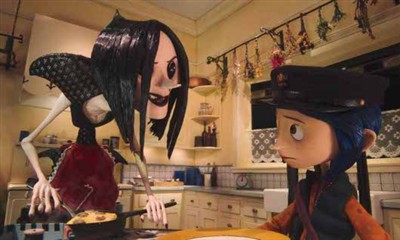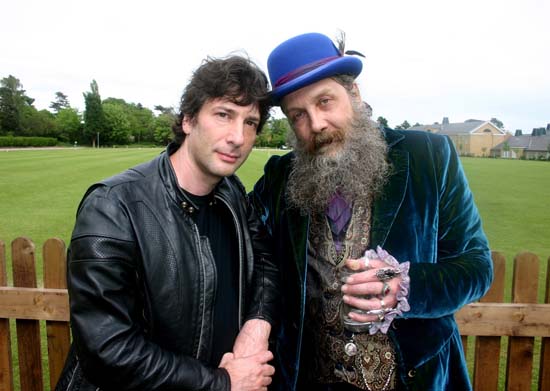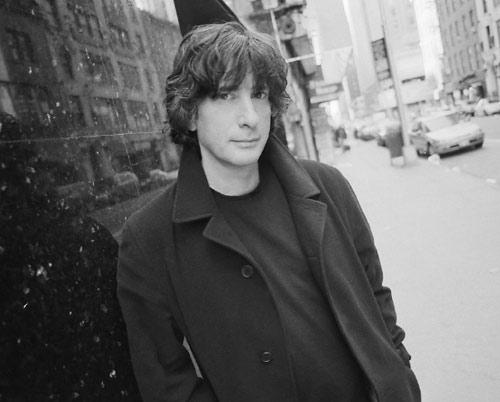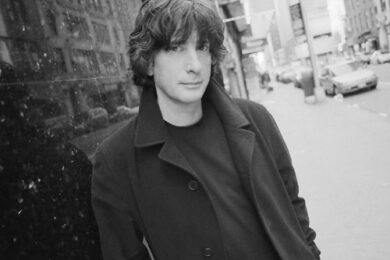There’s a great throwaway line in Neil Gaiman and Roger Avary’s screenplay for 2007’s Beowulf about how the "Christ God" has put an end to the time of heroes, battles and monsters. The film seems to lament the fact that monotheism replaced the rich pagan aural histories and their myriad gods and daemons, taking all the meaning out of the everyday and leaving humanity with nothing but "weeping martyrs."
Throughout his career, Neil Gaiman has bought myth back into everyday life. He creates fantasy which is not confined to silly elven universes; it’s relevant to a huge audience outside the world of Warhammer-playing obsessives (although they like him too). His most famous work, The Sandman series, inserted gods and allegorical personifications into a modern day world. Novels like American Gods and Anansi Boys liberally mix existing mythological characters with Gaiman’s own creations. Stardust, recently made into a film, takes a modern, playful approach to the classic fairy-tale format.
Gaiman’s children’s books are similarly imaginative and often tap into the darker, Grimm’s tradition of fairy tales. Coraline, a story he wrote for his two daughters, is about a girl whose family moves into a new house. She discovers a secret door leading to a parallel world in which everything is better and her parents pay attention to her. The only catch is that they have buttons for eyes.

The film adaptation, out this week, was directed by Henry Selick, the man behind The Nightmare Before Christmas (not Tim Burton) and James and the Giant Peach. With his dark sensibilities and unique style, Selick was the ideal choice to helm the project. Coraline is also the first stop-motion film to be filmed in the latest 3D technology (Nightmare Before Christmas was transferred after the fact).
Neil sat down with The Quietus recently to discuss Coraline, film adaptations and why JG Ballard was right all along.
It’s interesting how your work straddles children’s fiction and adult literature. You write children’s books which treat children like adults and adult books that allow adults to be children. So where do you draw the line? Are there certain things you shouldn’t do in children’s books?
Yeah, you shouldn’t bore them! There are certain things you could put into children’s books that would absolutely bore them. There are ways to write about sex in children’s books that are probably quite interesting to kids but you generally leave sexual specifics out because kids honestly don’t want that kind of stuff in there. It’s like when you’re a kid and you see a drunk throwing up across the street and you think – this is obviously part of some adult world that I don’t really want to be part of, so I think there are definitely things that you leave out.
It’s ironic then that Disney has this hold on the child market and yet they are constantly sexualising young girls like Hannah Montana and Britney Spears. It’s so backward.
I worry about Disney. I just feel like they’ve kind of ‘lost the plot’ in every meaning of the expression ‘lost the plot’. Some hard-line Christian website took me to task and called me a number of bad names for saying this, but I was talking about Disney Channel style Disney as being like pornography in its vision of an impossibly hospitable world: a world in which the big problem is that somebody hasn’t been invited to a surprise birthday party and then you discover toward the end that they really were and that there was nothing wrong at all and everybody loves everybody! Kids know that we do not live in an impossibly hospitable world, all of them do. These people are painting a picture of a world that, honestly, Walt Disney wouldn’t have recognised. People say "Is Coraline too scary for kids?" Well, what could you compare it too? What about Snow White. You want to talk about what you remember and what you treasure and I remember the witch in Snow White; I remember the whale in Pinocchio; I remember the fox and the cat in Pinocchio. Did I care about pretty blue fairies turning up? No, I didn’t give a toss about them, but I got that whale and I got that fox and that cat and the kids turning into donkeys – that was fucking scary.
Henry [Selick]’s first big film was a Disney film but they wouldn’t release it on the Disney banner. They put Tim Burton’s name on it to soften it and put it out as a Hollywood film – Tim Burton’s The Nightmare Before Christmas to give it its full title. It’s in the last few years, because it’s become such a huge financial success, that they finally acknowledged that it was a "Walt Disney" film.
Shifting gears to comic books. Have you seen Watchmen?
No.
Do you plan on seeing it?
Not particularly. I was kinda looking forward to it and then it came out and what I kept waiting for was someone I knew, whose opinion I respected, who liked Watchmen the way I liked Watchmen to say "You’ve got to see the film. It’s fucking awesome" and nobody did. They ‘d call me up and say, "I saw Watchmen.", I’d say "how is it?" and they’d say:
"Well, you’ll really enjoy the opening sequence and the end – they’ve replaced the squid but, actually in some ways you might even see it as an improvement and there’s some bits in it that are really, really faithful to the book and they made them all a bit ‘superhero’ which I didn’t really get and it’s a bit long and messy and it doesn’t really… No, but it’s really worth seeing. I don’t regret the time I spent watching Watchmen."
I kept hearing basic variants on that, over and over again and nobody said "it’s fucking wonderful, go and see it!". I saw The Dark Knight. Why? Because people just kept saying "You’ve got to see Heath Ledger" and "It’s awesome!" and I did and it was!

Watchmen was something incredibly close to my heart. I was one of the first people ever to see Watchmen. In a world before there was Watchmen there was Alan Moore saying
[doing his best Alan Moore] "Neil, take a look at these, just a couple of photocopies".
"Who’s drawing this?"
"Dave Gibbons."
"Really? Doesn’t look like Dave Gibbons"
I read 1 and 2 and thought, "This is amazing" and then next time I saw him, he had 3 and 4 and I thought "This might be the best thing anyone’s ever done!" in mainstream comics that is. That was really early and I was reading and re-reading these photocopies. Then the comics would come out and I would go through to get the back material and see the colour. It was incredibly close to me and important.
Everyone has an opinion on the squid change and many did think that it was an improvement or that it made more sense in movie form. As someone who has ventured into screenwriting and especially adaptation, when is it acceptable to make a huge change like that?
The first thing I ever had adapted in anyway was my first graphic novel Violent Cases and it was adapted for the stage by a really smart director and a really good actor. I went along to the first night and I sat there in the audience watching my story being done so absolutely and utterly faithfully that I was mouthing along line-for-line, because I new my story word for word and it was all up there. I walked away from it at the end fascinated by the fact that things that had been huge and violent and important in the graphic novel had come across as twee and small on the stage; that things that were small and unimportant in the graphic novel had been the moments of genuine stage magic; that the entire shape of the thing had become this little misty eyed exercise in nostalgia; that the dark thing in the graphic novel wasn’t there. And I realised at that moment that you cannot simply transliterate from one medium to another, you have to translate: you have to find those moments of theatrical magic. Henry has translated Coraline into the cinema and on June 1, Stephen Merrik and his collaborators will translate it into musical theatre. Neither of those is the book, however, only the book is the book.
Finally, any thoughts on J.G. Ballard’s legacy?
I think that the most important most fascinating and most disturbing thing about Ballard and his legacy is that when I was 13 or 14 years old, I figured that the people who had predicted the future were the ones that said they were predicting the future – that we were heading toward an Asimovian future or a Heinleinian future. It wasn’t until the death of princess Di that I realised that the only great futurologist that we ever had was J.G. Ballard, who wrote that in Crash 30 years before. The only person out of all the science fiction writers who was completely right was Ballard. I still find that both peculiar and unsettling. I met Jim several times and I was always delighted that the greatest bomb-throwing-anarchist that we had in English letters, who lived beneath the surface like some kind of pod person, was also the most terrifyingly normal man I have ever met.



